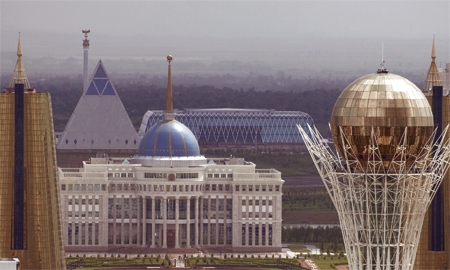Kazakhstan was also the first among the Commonwealth of Independent States (CIS) to pay off its debt to the International Monetary Fund (IMF), which it did seven years ahead of schedule to boot.
It is the largest former Soviet republic in size; it is the first to assume the chairmanship of the Organization for Security and Cooperation in Europe (OSCE); and it is home to the most sophisticated financial market in Central Asia and the entire post-Soviet region. Kazakhstan was also the first among the Commonwealth of Independent States (CIS) to pay off its debt to the International Monetary Fund (IMF), which it did seven years ahead of schedule to boot.
Moreover, the country is the most economically dynamic nation in the region, with 85% of the economy controlled by the private sector and the highest foreign direct investment (FDI) per capita within the CIS. Since independence, Kazakhstan has attracted well over $80 billion in FDI.
In short, Kazakhstan is quite the regional power, and its importance continues to rise as the government expedites economic reforms in line with international standards and assumes a greater international leadership role.
Europe looks to Kazakhstan for its wealth of natural resources and the Far East sees it as a logical and safe passageway for transporting goods across the Eurasian landmass. The United States – the first country to recognize Kazakhstan’s independence at the end of 1991 – holds close political and economic relationship, with bilateral trade with the Central Asian nation surpassing $45 billion in 2008.
Transparency, regulation and excessive government expenditure are some of the issues the Kazakhstani government is currently addressing to improve the business environment and attract more investment. However, improvements in business freedom, property rights and labor freedom have already been noted by the international community: the Heritage Foundation’s 2011 Index of Economic Freedom, Kazakhstan is ranked as the 78th freest economy, having previously been placed at 83rd in 2009.
The World Bank also observes progress. In the organization’s 2011 Ease of Doing Business Report, Kazakhstan ranks 59th, a significant jump up from 70th place two years ago.
According to Frank Pannier, CEO and director general of
ArcelorMittal Kazakhstan, there are a number of things that make Kazakhstan attractive to foreign investors.
He says: “During a time of economic crisis, the political leadership of the country has proved to be extremely flexible in terms of stimulating economic growth by adapting the legislation to the needs of the business community through methods such as changes in the tax code, reductions in corporate income tax and more flexibility in the investment code, etc.”
Although the economy did not remain immune to the effects of the recent global economic downturn – due in part to its strong reliance on oil and an over extended banking sector – the outlook for GDP growth is positive for the coming years, after an exceptional comeback in 2010. Growth hit 7% in 2010 after a dip down to just 1.2% in 2009, and the Economist Intelligence Unit predicts expansion of 6.7% in 2011, a figure that could gradually decrease through 2015 to land at 5.4%.
President Nazarbayev, in power since before independence and who enjoys a genuine level of popular support, is intent on diversifying the economy, raising national competitiveness, and continuing to bring about an improved standard of living for the republic’s citizens.
As Kazakhstan celebrates its 20th anniversary of independence this year, the country has much to celebrate and a great deal to look forward to.

0 COMMENTS